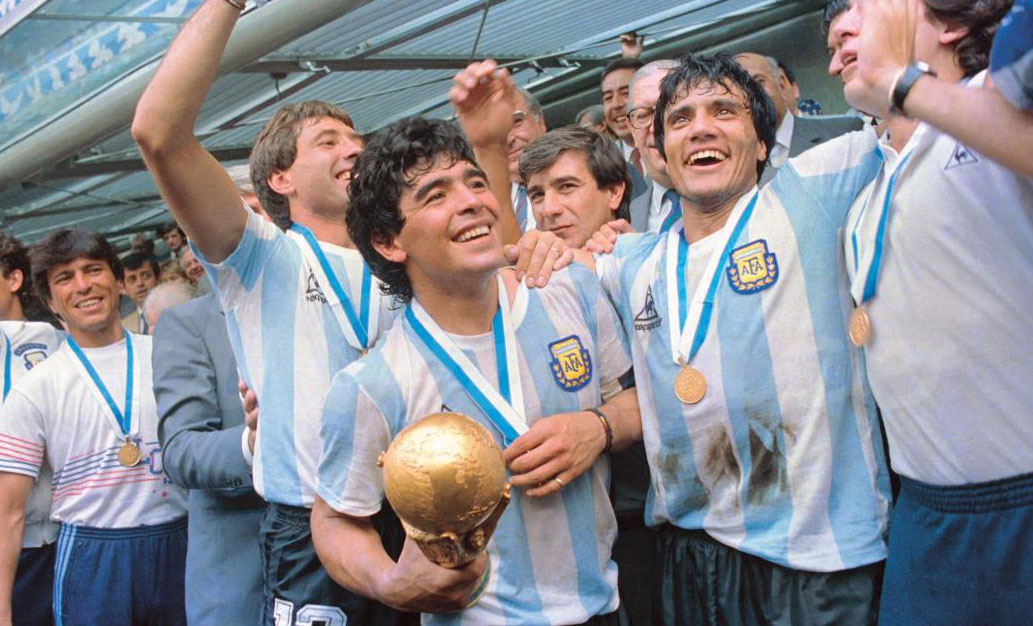A history of great players and dramatic moments make up Albiceleste’s unique World Cup story.
When it comes to ranking the South American football powerhouses, Brazil and Argentina’s names are always the first that comes to mind.
As Copa America’s record-winners, Argentina clearly win the continental rivalry. But Brazil’s five World Cup titles unfairly overshadow a number of fantastic displays by the Albiceleste in the tournament.
Let’s review Argentina’s greatest World Cup campaigns of all time.
3- World Cup 2014: Messi and a nightmare last act

Argentina started their 2014 campaign with brilliant form in the group stage.
Alejandro Sabella’s team had several weak spots in their lineup. But Lionel Messi’s magic helped them win all of their group-stage matches.
Messi scored four goals against Bosnia and Herzegovina, Iran, and Nigeria as the Albiceleste qualified for the last-16 round.
Argentina then defeated Switzerland and Belgium with 1-0 wins, surviving two tough battles with solid defence.
In their semi-final match against Netherlands, Argentina were arguably the better side throughout the 120 minutes. But a goalless draw forced the two sides to face off in penalties.
Following two missed spot-kicks from Wesley Sneijder and Ron Vlaar, Messi converted Argentina’s fourth penalty to send them to the final.
Everything seemed ready for Messi to claim his first major international trophy in the final against Germany.
The Albiceleste quickly found their rhythm at the Maracana Stadium. But missed chances from Messi and Gonzalo Higuain enabled Germany to bounce back.
Die Mannschaft weren’t able to find the back of the net either, as the game went to extra time. The match seemed destined to be decided in the penalties, but then came Mario Gotze’s winner in the 113th minute.
The goal secured Germany’s fourth World Cup trophy as it ended Messi’s dream of leading Argentina to their first title since 1986.
2- World Cup 1978: Political controversy and maiden title

Argentina played the 1978 tournament on home soil, hoping to finally win their first World Cup title.
They did so after a host of controversial matches, which saw other teams accusing Argentina’s military government of match-fixing.
The Albiceleste had to compete against Italy, France, and Hungary in the tournament’s ‘Group of Death’. They managed to secure a place in the next round after winning their first two games.
However, their 1-0 defeat against Italy saw them qualify as the second team, forcing them to play their second-round games out of Buenos Aires.
Argentina went on to beat Poland and Peru while drawing 0-0 against Brazil in Group B. They were level on points with Brazil but reached the final with a higher goal difference.
Brazil accused Argentina of match-fixing in their 6-0 win over Peru, which proved crucial to their bid to qualify for the final.
On June 25, Argentina returned to Buenos Aires to face Netherlands in the World Cup 1978 final.
A 17-year-old Diego Maradona had already established himself as a domestic star, but manager César Luis Menotti decided not to include him in the squad.
The No.10 role was played by Mario Kempes, who became the tournament’s top-scorer and won the Ballon d’Or shortly afterwards.
Kempes scored the opener for the hosts in the first half before Dick Nanninga made it 1-1 in the 82nd minute. A highly controversial extra-time then saw Kempes and Bertoni secure Argentina’s title with two more goals.
Netherlands didn’t attend the award ceremony after the 3-1 defeat. But it didn’t undermine Argentina’s massive achievement of winning their first World Cup title.
World Cup 1986: Hand of god and the start of a new rivalry

Eight years after winning the title on home soil, Argentina dreamed of repeating their success in Mexico.
Compared to the star-studded squad of the 1978 World Cup, Argentina had grown weaker in several positions. But the magical presence of one player determined the outcome of the tournament: Diego Armando Maradona.
Maradona scored only once in the group stage, finding the back of the net in the 1-1 draw against Italy. The Albiceleste, however, managed to qualify as the group leaders after beating Bulgaria and South Korea.
A hard-fought battle against Uruguay in the round of 16 saw Argentina qualify for the next round with a 1-0 win.
The Albiceleste then met England in a politically-charged match. Four years after Falklands War, Maradona scored two of the most iconic goals in football history to win the game for Argentina.
The famous ‘Hand of God’ goal saw Maradona put Argentina ahead with a handball in the 51st minute. He then dribbled past five English players to double his side’s lead only four minutes later.
England managed to score a late goal through Gary Lineker, but that wasn’t enough to prevent Argentina’s victory.
Maradona scored two more goals in the semi-final clash against Belgium to send Argentina to the final with an easy win.
Argentina were the clear underdogs when they faced Germany in the final. The Germans boasted a star-studded squad, which combined experienced stars such as Karl-Heinz Rummenigge with younger players like Lothar Matthaus.
Two goals from Jose Luis Brown and Jorge Valdano stunned Die Mannschaft and put Argentina 2-0 ahead. But Germany managed to come back with late goals from Rummenigge and Rudi Voller.
Both sides were pushing to find the winner when Maradona provided a fantastic through ball for Jorge Burruchaga in the 84th minute.
The midfielder positioned himself in a one-on-one situation against Herald Schumacher before winning the trophy for Argentina with a precise low shot.
The game started the rivalry between Germany and Argentina, which has seen them face off in two more World Cup finals since then.









